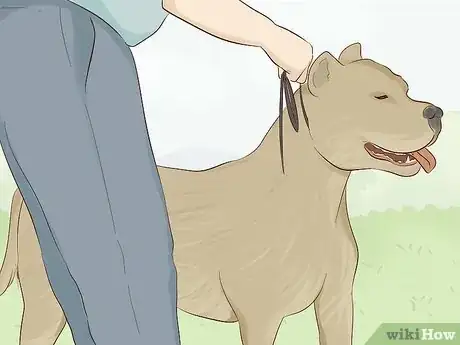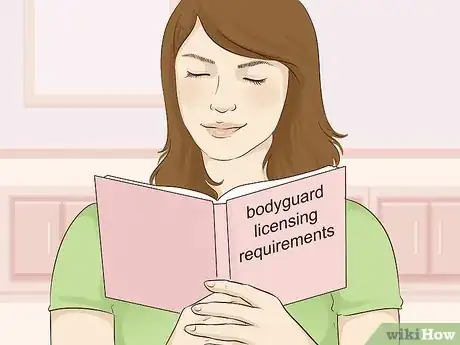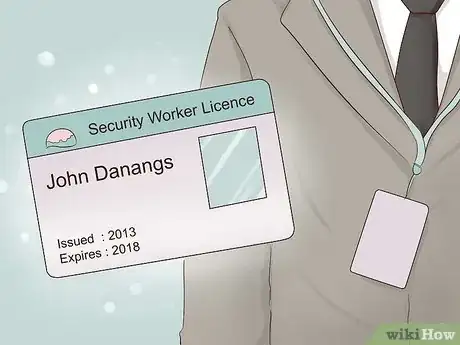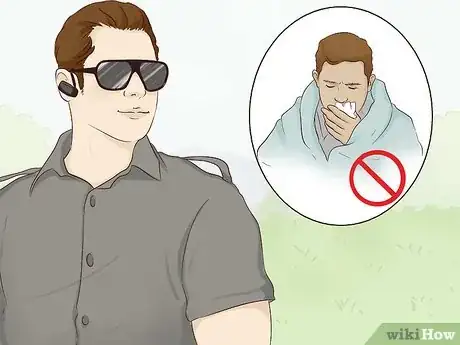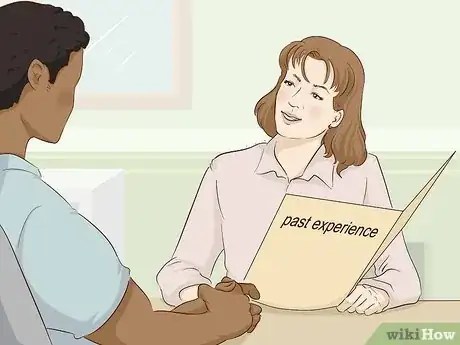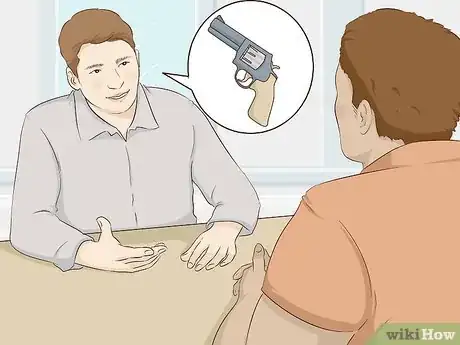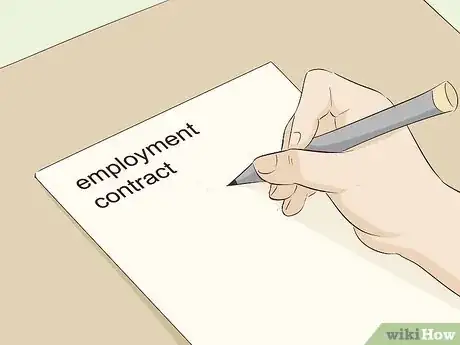This article was co-authored by Asher Smiley. Asher Smiley is the Owner and Lead Instructor at Krav Maga Revolution in Petaluma, California. Asher has earned a Tier 1 Instructor Certification in the American Krav Maga system. In 2017, he trained with the International Kapap Federation Combat Krav Maga International, completing their 7 day tactical seminar and the 8 day CKMI instructor course.
There are 13 references cited in this article, which can be found at the bottom of the page.
This article has been viewed 320,637 times.
If you find yourself in a dangerous situation or are often approached by undesirable people (like paparazzi or obsessive fans), hiring a bodyguard can keep you safe. Don't just hire any muscle-bound person off of the street to be your bodyguard. Contact local executive protection agencies and interview potential candidates to make sure you find the right fit. Choose a bodyguard that is certified with both your country and an official bodyguard association to make sure you're getting trustworthy security.
Steps
Evaluating Options
-
1Set a budget before you research possible bodyguards. Depending on your needs, hiring a bodyguard can set you back from $200 to over $900 a day, with expenses depending on the level of potential danger and if you need an armed guard. Using your salary as a guide, decide how much you're willing to spend on a bodyguard.[1]
- Bodyguards from respected agencies will cost more than less reliable bodyguards.
- Check many different bodyguard options to make sure you're getting the best guard for your price.
-
2Choose between an executive protection or hostile environment bodyguard. Most bodyguards belong to one of two different classes. Executive protection bodyguards protect celebrities, politicians, royalty, or others needing professional protection. Hostile environment bodyguards are more military-oriented and carry out close, constant protection.[2]Advertisement
-
3Determine when and in what situations you will need a bodyguard. Some bodyguards are trained for round-the-clock protection, while others only guard during nights or while transporting their client from one location to another. Think about your needs and where you will most need your bodyguard.[3]
-
4Look for bodyguards listed with a professional agency. Independently-contracted bodyguards do exist, but it might be harder to find a reliable source unless you ask for recommendations from those you know. If you don't know many others with a bodyguard, research respected agencies in your area.[4]
- Make sure the agency you choose is legitimate before contacting them. Check for online reviews or previous clients to gauge their authenticity.
Finding Candidates
-
1Opt for a guard dog as a cheaper alternative. If bodyguards are beyond your budget but you still need some protection, a guard dog can provide you with basic needs. Look for specially-trained guard dog agencies in your area.[5]
- German shepherds are especially known for their guard dog services due to their powerful jaws.
-
2Research bodyguard licensing requirements in your country. Your state or country may have specific requirements for issuing personal security requirements. Check your location's licensing requirements and make sure you vet candidates for this license. Clients without a license may lack training skills or have illegal reasons for not regulating their services with the country.
-
3Look for bodyguards with professionally-issued certifications. Separate from government-issued licensing, choose an executive guard certified with professional training centers. Many states or countries have protection services institutes or training groups that offer certifications to bodyguards.[6]
- The certifications you'll want your bodyguard to have will vary depending on your personal needs. You might want a bodyguard certified with the U.S. Navy if you'll be traveling overseas, for example, or a bodyguard with forensic certification if your situation involves criminal activity.
-
4Ask bodyguards if they are affiliated with any official organizations. Most locations have official organizations to provide support and networking for bodyguards. These organizations often have requirements that bodyguards must meet before they qualify as members. If there are no bodyguard organizations in your area, ask whether your candidate is affiliated with any military veteran organizations.
- The largest bodyguarding organization is the International Bodyguard Association (IBA).[7]
-
5Conduct a background check on your chosen candidate. Before you settle on a bodyguard, research their criminal history to make sure you're choosing a reliable and safe candidate. Although you can look up criminal records online, pay for a background check to make sure your candidate has been thoroughly searched.[8]
Interviewing Candidates
-
1Look for a bodyguard with optimum physical health. Bodyguards need to be in good shape so they can protect their clients and fight off potential attackers. Ask your potential bodyguard how they keep themselves physically fit. Avoid bodyguards who seem sickly or in poor physical health.[9]
-
2Have your candidate describe past experience. Ask bodyguard candidates to talk about their previous employers and what these positions involved. Talk with them about any specializations or unique skills they offer. If their employment with a past client recently ended, ask them to describe why this relationship has ended.
- Pay special attention to bodyguards who have worked with clients in a similar situation as yourself.
-
3Ask candidates how they respond to high-stress situations. The perfect bodyguard will keep a cool head in times of emergencies and prioritize keeping their client safe above all else. Choose a bodyguard with quick thinking skills and experience working in dangerous locations.[10]
- Candidates with a military background often have extensive experience in crises.
-
4Talk with candidates about their experience with weaponry and martial arts. Depending on your situation, you may need a security guard with a firearm license or who can defuse aggressions with physical attacks. Ask your bodyguard whether they can carry arms and if they have any martial arts training if you expect that you will need significant protection.
-
5Ask for references. Request references from their previous clients and any agencies that they have worked with. Contact these references about any remaining questions you have regarding the bodyguard. Ask them specifically if they would recommend this bodyguard and, if so, in what situations.
Working with a Bodyguard
-
1Write an employment contract for you and your security professional. Your employment contract should include the start and end date, pay rate, holidays, and working conditions. Have your bodyguard sign the contract to make it legally binding.[11]
- Employment contracts must be in writing to be legally valid and to avoid misunderstandings with your candidate.
-
2Evaluate your bodyguard's situational awareness. You may not be able to see how well your bodyguard analyzes their surroundings until they are on the job. Watch your bodyguard as they work to make sure they have a keen eye and are proactive in stressful situations.[12]
-
3Watch the way your bodyguard behaves around others. Assess your bodyguard's communication skills, particularly around your friends or associates. Your bodyguard should be able to talk clearly, confidently, and with reasonable eloquence. In addition, make sure your bodyguard listens well and can interpret assignments well.[13]
- Bodyguards with poor communication skills can misunderstand instructions, read situations poorly, and make many mistakes when under stress.
-
4Inquire about your bodyguard's physical wellness over time. Watch for signs of physical sick or deterioration in your security professional. Not only is their health important for their own sake, but an ill or physically-unfit bodyguard will be unable to protect you. In case of serious illness, accidents, or other situations, you may need to terminate a contract early if your bodyguard's abilities are restricted.[14]
- Ask your bodyguard to receive an annual physical check-up to evaluate their health.
Expert Q&A
Did you know you can get expert answers for this article?
Unlock expert answers by supporting wikiHow
-
QuestionWhen do you need a bodyguard?
 Asher SmileyAsher Smiley is the Owner and Lead Instructor at Krav Maga Revolution in Petaluma, California. Asher has earned a Tier 1 Instructor Certification in the American Krav Maga system. In 2017, he trained with the International Kapap Federation Combat Krav Maga International, completing their 7 day tactical seminar and the 8 day CKMI instructor course.
Asher SmileyAsher Smiley is the Owner and Lead Instructor at Krav Maga Revolution in Petaluma, California. Asher has earned a Tier 1 Instructor Certification in the American Krav Maga system. In 2017, he trained with the International Kapap Federation Combat Krav Maga International, completing their 7 day tactical seminar and the 8 day CKMI instructor course.
Personal Safety Trainer
Warnings
- A bodyguard's job is not to beat someone up. Bodyguards protect their clients but do not attack people that you don't like.⧼thumbs_response⧽
- Avoid hiring bodyguards with a large ego or overly "gung-ho" personality, as either might not have your best interests in mind when crises arise.⧼thumbs_response⧽
References
- ↑ http://www.whatitcosts.com/hire-bodyguard-cost/
- ↑ https://www.intelligent-protection.co.uk/how-to-hire-a-bodyguard.html
- ↑ https://nationalcareersservice.direct.gov.uk/job-profiles/bodyguard
- ↑ http://www.jobmonkey.com/uniquejobs/bodyguard/
- ↑ http://www.businessinsider.com/cost-of-bodyguards-executive-security-2012-1?op=1/#nus-guard-dogs-9
- ↑ http://www.expertsecuritytips.com/how-to-hire-a-bodyguard/
- ↑ http://www.ibabodyguards.com/
- ↑ http://www.expertsecuritytips.com/how-to-hire-a-bodyguard/
- ↑ http://learningpath.org/articles/Becoming_a_Bodyguard_Job_Description_Salary_Information.html
- ↑ http://www.expertsecuritytips.com/duties-of-a-security-guard/
- ↑ http://www.acas.org.uk/index.aspx?articleid=1577
- ↑ https://circuit-magazine.com/what-are-the-characteristics-of-a-good-bodyguard/
- ↑ http://www.expertsecuritytips.com/attributes-qualities-executive-protection-professional/
- ↑ https://www.youtube.com/watch?v=qhI-srBxwO0&feature=youtu.be&t=13
About This Article
If you’re concerned about your safety, you can hire a bodyguard to suit your needs and keep you safe at all times. You can get a bodyguard round-the-clock or just for certain hours or events. Search online for well-reviewed body guard agencies in your area to see what they offer. Choose someone with the necessary licenses and certifications for your area. If they’re affiliated with the International Bodyguard Association, you’ll know they meet high security standards. It’s important you have a good relationship with your bodyguard, so feel free to interview a few different people. Ask about their job history, how they’d deal with different confrontations, and if they have any martial arts and weapons training. For more tips from our Security co-author, including how to draft an employment contract for your bodyguard, read on!




